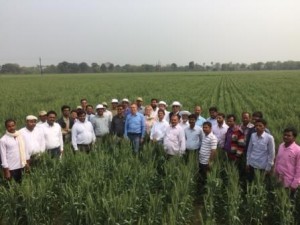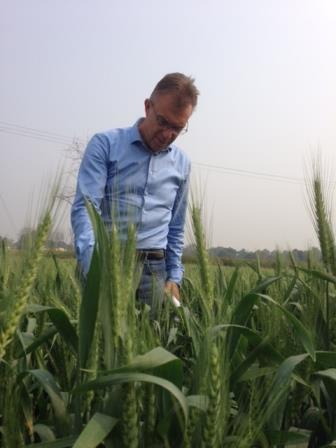
NEW DELHI — The International Maize and Wheat Improvement Center (CIMMYT) Director General Martin Kropff presented the organization’s draft strategy with its unifying vision of ‘One CIMMYT’ at the staff session in the Delhi office during his India visit from 24 February to 3 March. Kropff highlighted that CIMMYT’s excellent scientific work, global presence, partnerships and people are its strengths. However, the organization needs to focus on engaging with new donors and increasing organizational effectiveness in the future.
In the meeting, Kropff shared reflections on his eight months at CIMMYT, emphasizing that improving integration among different projects, teams and geographies through shared values and teamwork will help to achieve a common mission: “Maize & Wheat Science for Improved livelihoods.”

Staff discussed different elements of the strategy in smaller group breakout sessions and suggested various steps to raise scientific excellence, increase capacity building and to achieve the One CIMMYT objective across all regions. The groups agreed that the “will play a key role in bringing innovative ideas and developing the next generation of well-trained scientists.
During his first visit to the state of Bihar, Kropff visited BISA research farm at Pusa, where he was accompanied by Hari S. Gupta, Director General of BISA, senior officials from Rajendra Agriculture University and CIMMYT scientists. Raj Kumar Jat, BISA cropping systems agronomist, explained the positive impacts of long-term conservation agriculture research on productivity, profitability and soil health at the farm. Kropff saw demonstrations of small farm mechanization, climate-smart practices and the latest research tools and techniques for breeding crop varieties.
The team visited the research platform of the Cereal Systems Initiative for South Asia (CSISA) project in Patna. R.K. Malik, CIMMYT cropping systems agronomist, highlighted that research results have shown that using shorter hybrid rice varieties can help facilitate an early rice harvest and advance wheat sowing. This will help combat the adverse effects of climate change such as rising heat during the wheat ripening phase and will increase wheat productivity in Bihar. Kropff also interacted with women farmers and service providers to understand their business development services around service provision model.
Kropff and the CIMMYT-BISA team then met with Nitish Kumar, Bihar Chief Minister to discuss how CIMMYT and BISA’s work on new technologies could be helpful to double the productivity in the state with less cost and less water while improving the soil quality. The meeting was also attended by the senior officials of the state government and the Agricultural Production Commissioner of Bihar.
 Capacity development
Capacity development